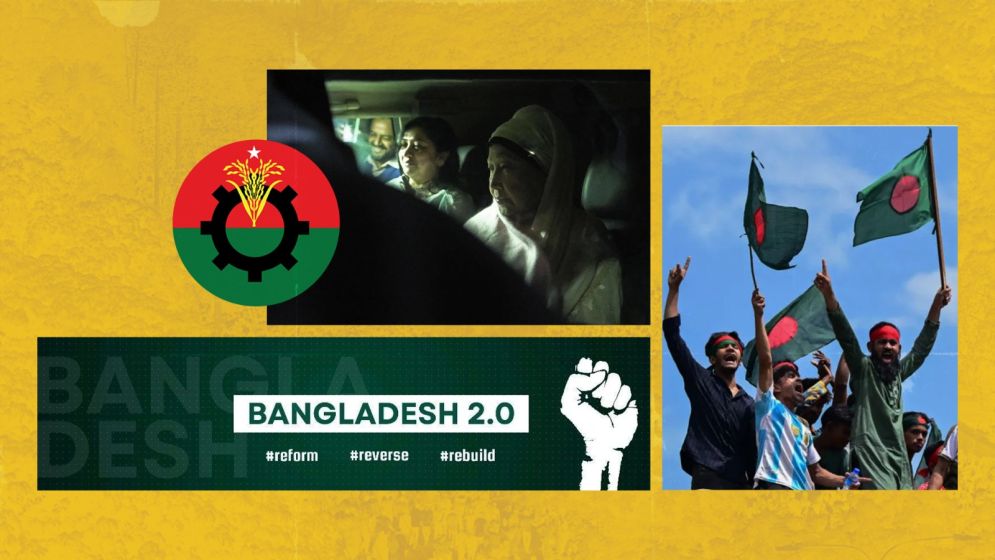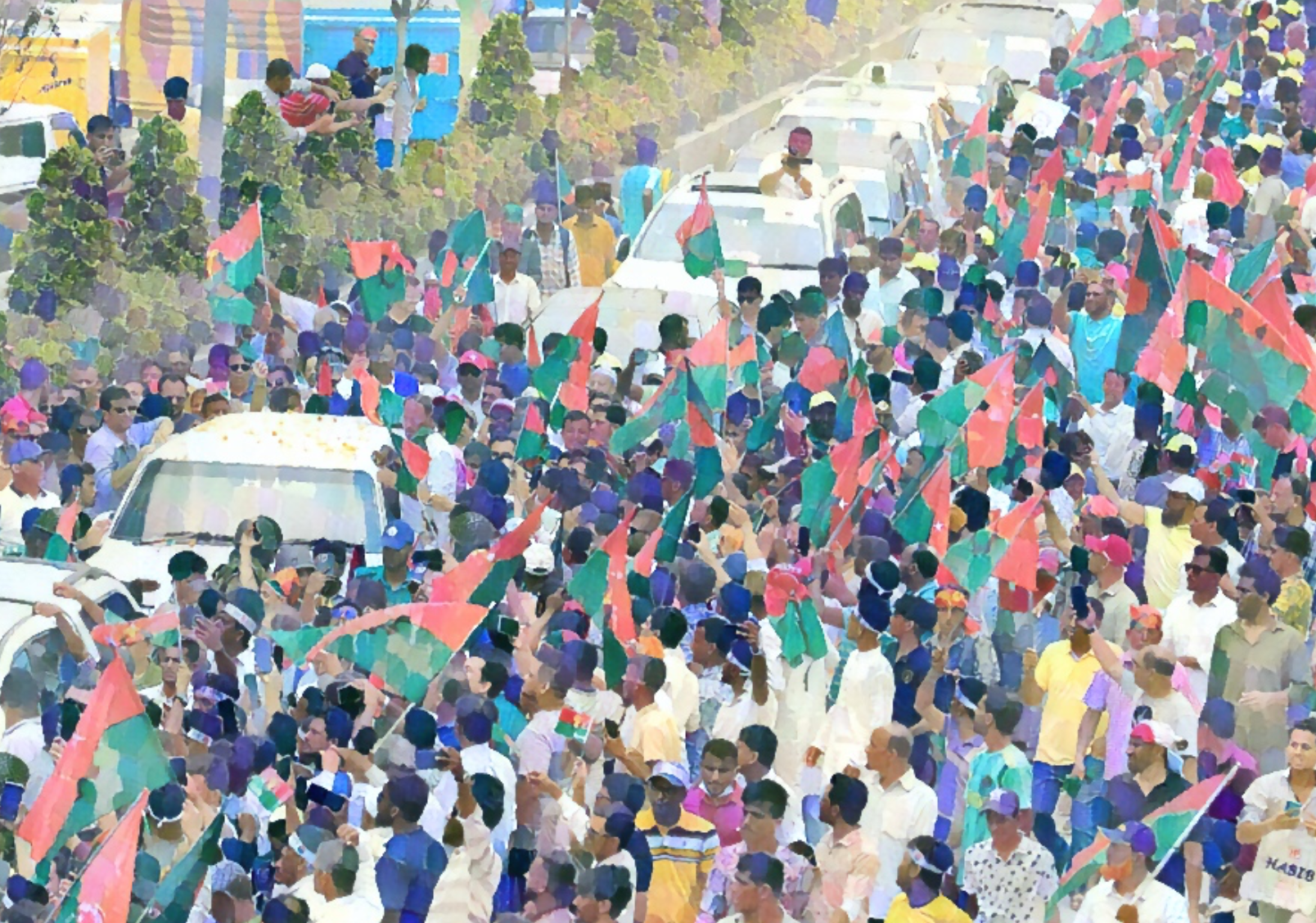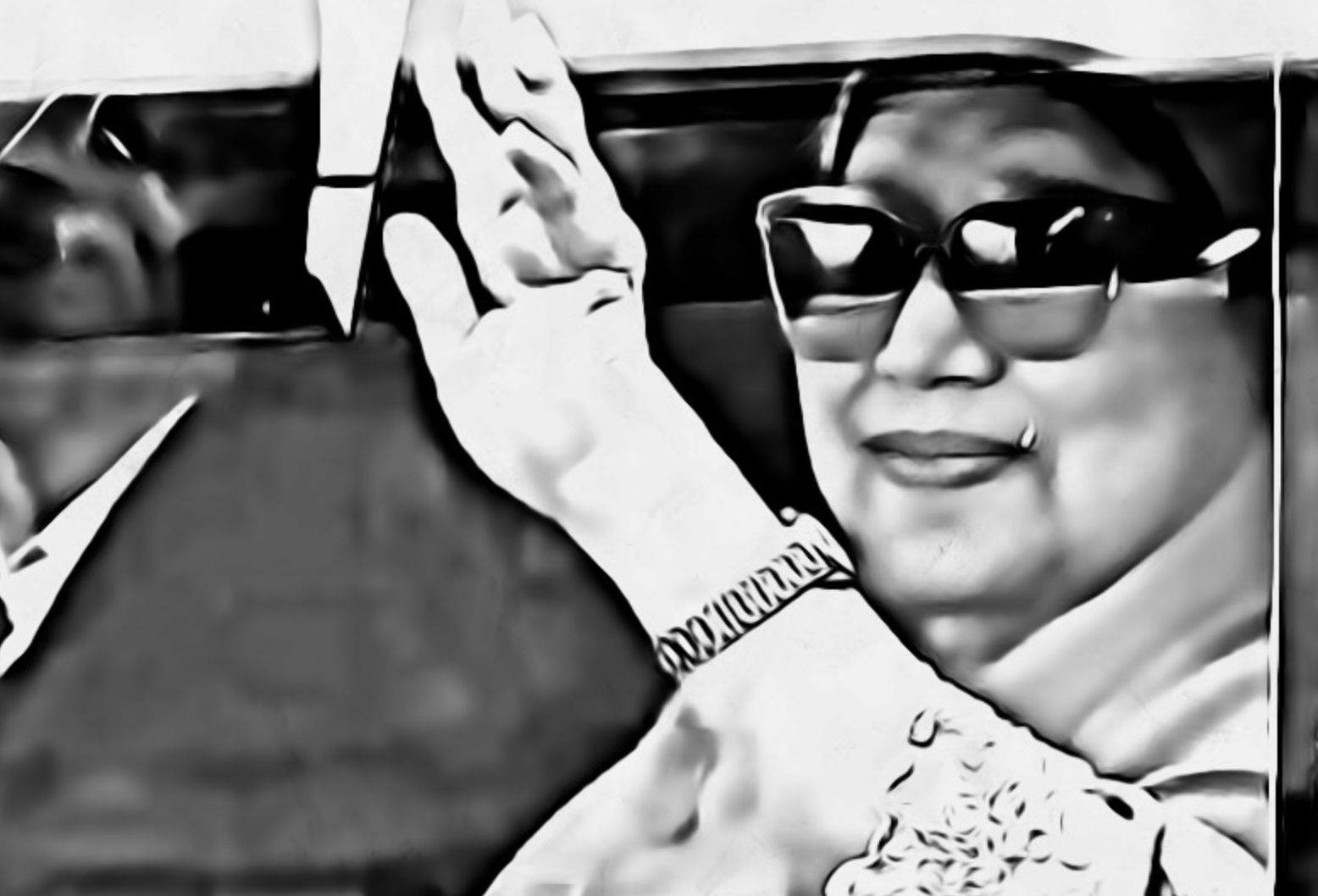The return of Khaleda Zia isn’t just political….it’s personal for a nation in limbo

The skies over Dhaka on Tuesday afternoon were choked–not just with heat and dust, but with something far more combustible: memory.
In a city where protest is practically a civic ritual, the return of Khaleda Zia, long absent from public life, cracked open a moment of rare collective suspense.
Streets overflowed. Rooftops swayed under the weight of onlookers. Old posters bearing her face, faded by years of disuse, fluttered like ghosts refusing to be buried.
Khaleda Zia’s return from a four-month medical stay in London was more than the homecoming of a former Prime Minister. It was the reappearance of a figure who, despite age and illness, still embodies the country’s unresolved tension between authoritarian control and democratic yearning.
Her arrival in a wheelchair–wrapped in a light beige clothing, silent but unmistakably present–became a tableau of both vulnerability and defiance.
She did not speak. She didn’t need to. The city spoke for her.
The shouts and cheers that met her were a visceral reaction to a system that has grown unnervingly airtight–where opposition is neutered, elections are foregone conclusions, and dissent is increasingly equated with disloyalty.
Khaleda Zia has been many things: Bangladesh’s first female Prime Minister, an architect of policy, a lightning rod for controversy, and a prisoner of political circumstance.
She has also been–perhaps most fatefully–a symbol. And in Bangladesh today, symbols are one of the most valuable currencies.
Mind it, this is not a story of a political comeback in the conventional sense. At 79, frail and removed from day-to-day party machinery, Zia is unlikely to lead her party–the Bangladesh Nationalist Party (BNP)--back to electoral relevance on her own.
But power doesn’t always require executive office. Sometimes, especially in places where democracy is under siege, mere presence is enough to rattle the status quo.
That is what her return represents: a challenge not of policy, but of narrative. A reminder that history has not yet been entirely rewritten by those in power.
For many of the young who greeted her–people like Dipto, a 28-year-old activist who wasn’t even a teenager when Zia last held power–this wasn’t about nostalgia. It was about needing something, anything, to believe in.
“She is the mother of our democracy,” he said, gripping a battered BNP flag. Hyperbole? Maybe. But also a reflection of how starved this generation is for moral reference points in public life.

Larger than
politics, and life
To dismiss Zia’s return as mere pageantry is to miss the point.
Her presence disrupts the illusion that the democratic experiment has quietly ended without anyone noticing.
Bangladesh stands at an uncomfortable crossroads. Even after the ouster of autocrat Sheikh Hasina, civil society is constrained, the press increasingly cowed.
In such an environment, symbolism matters more than strategy. And Khaleda Zia matters more than anyone else.
Political psychologist Harold Lasswell once observed that symbols, not facts, govern political life. In Bangladesh today, few images are more symbolically loaded than Khaleda Zia–frail, in a wheelchair, waving silently to a sea of supporters.
It’s a picture not of power, but of perseverance. Not of victory, but of survival. And survival, in Bangladesh’s stifling political climate under Hasina’s despotic ruling , was itself an act of resistance.
BNP, which Begum Zia once led to sweeping electoral wins, has long been a battered version of its former self during the last one and half decades.
Years of crackdowns, court cases, and infighting have hollowed it out. Many expected it to simply dissolve under pressure–yet here it is, still standing.
Within BNP ranks, a new name is rising–Dr. Zubaida Rahman, a medical professional and the wife of acting chairman Tarique Rahman. In sharp contrast to the party’s embattled leadership, Zubaida presents a fresh face: competent, uncontroversial, and largely untouched by the political trench warfare that has defined BNP's recent history.
Whether she is prepared–or permitted–to take a leading role remains an open question. But her emergence marks the beginning of a conversation long overdue: What should the BNP be now, not just what it was?
Khaleda Zia and Zubaida Rahman represent two poles of this conversation. One is the weight of legacy; the other, the hope of reinvention.
Yet this is not a political drama unfolding in a vacuum.
Bangladesh is currently governed by a transitional authority led by Dr. Muhammad Yunus, the Nobel laureate whose legacy in microfinance is now being tested against the far more volatile task of political stewardship.
Yunus is widely respected abroad, but governing a fractured, distrustful domestic scene is not a donor conference–it’s a street fight.
Khaleda Zia’s return throws that reality into sharper relief. Her presence now demands that the interim government do more than manage stability. It must prove that democratic process is not just a promise, but a practice.
Her return obviously intensifies pressure for a credible roadmap to national elections.

Captain for
unchartered water
Political theorist Robert Dahl once wrote that democracy is not only about competition–it is about participation.
That principle feels dangerously tenuous in Bangladesh today, where the line between law and strategy is often blurred, and where inclusion has been replaced by curation.
The challenge facing the Yunus administration is stark: Will it allow real politics to breathe again soon? Or will it preserve calm by bypassing the imminent?
Khaleda Zia’s homecoming makes that question unavoidable. In the streets, the message is already clear: people are tired of symbolic democracy. They want the real thing.
Of course, no portrait of Khaleda Zia is complete without its cracks. Her record is uneven, her politics often combative, and her legacy is contested. But history–real history–is rarely neat.
It doesn’t move in straight lines or offer tidy resolutions. It stumbles, backtracks, and sometimes contradicts itself. And in those contradictions, we often find the most enduring truths.
Yes, Khaleda Zia made mistakes. But she also made history.
She championed women’s education in a country where it was far from guaranteed. She pushed for regional cooperation long before such language became fashionable at global forums.
She raised the alarm on the Rohingya crisis when others looked away.
It wasn’t what she said–she said very little–it was what she didn’t say. No vengeful rhetoric. No score-settling. Just a wave, a nod, and a presence that somehow managed to upstage every microphone in the room.
In a political landscape addicted to outrage, Khaleda Zia’s restraint felt jarring. She didn’t come back to roar. She came back to remind. And in doing so, she slipped into a different role altogether–not the political gladiator of old, but something closer to a reflective elder.
A former prime minister transformed, if only momentarily, into a stateswoman.
That restraint–so rare, so unfashionable–carried a kind of moral weight. It suggested that maybe, just maybe, dignity still has a place in public life.
There is something psychological at play here too. Carl Jung once described “collective catharsis” as those rare moments when a society confronts its wounds together.
Khaleda Zia’s return felt like one of those moments. A mirror, held up not just to her party or her rivals, but to the nation itself.
For decades, Bangladesh has defined itself by what it resists–military rule, foreign intervention, political monopolies. But now the challenge is different. It must define itself by what it builds: credible institutions, pluralism, and a future not held hostage by its past.
In the days after Begum Zia’s return, Dhaka’s streets slowly emptied. The posters began to sag under the weight of humidity. The slogans faded. But something else remained–a flicker of something the country hasn’t felt in a long time: belief.
Not in personalities, but in the idea that this story isn’t finished. That perhaps, even now, there’s room to turn the page.
—
H. M. Nazmul Alam is an Academic, Journalist, and Political Analyst based in Dhaka, Bangladesh. He can be reached at [email protected]

